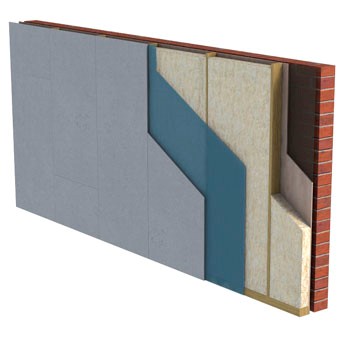Timber frame wall insulation
The many benefits of timber frame construction have seen it become one of the most widely used construction methods in the UK today. Its inherent advantages include pre-engineered quality, speed of construction and the sustainability of the raw material.
Timber frame buildings also offer environmentally friendly construction through low energy input levels (the energy required to manufacture, deliver and install a product) and this quality is continued through to the thermal performance of the building.
Using mineral wool insulation, insulated external timber frame walls will typically provide better insulation performance than masonry walls of a similar thickness.
The insulation is supplied to fit tightly between standard stud widths without the need for on-site cutting, and is self supporting. If cutting is required, the compressible insulation can be cut slightly oversize and friction fit between the studs to prevent cold air penetrating through the joints.
- Insulation fits in a single step
- Sized to fit tightly between studs at standard centres
- Enhances acoustic performance of walls
Different products and thicknesses can be employed to achieve required U-values. The U-value of a timber frame property, calculated using BS EN ISO 6946, will be the efficiency of a building as a whole, but the insulation used in timber frame wall will have a major bearing on its overall energy efficiency.

The benefits of Mineral Wool
- Value for money - more cost effective than any other material available
- Thermal performance - compression fit minimizes gaps at joints
- Acoustic performance - excellent sound absorption
- Environmental - uses recycled material, zero ODP & GWP, BRE Green Guide A+ to B
- Fire properties - non-combustible and A1/A2 Euroclass fire rated
- Easy-to-fit - simple installation process, covers large areas quickly
